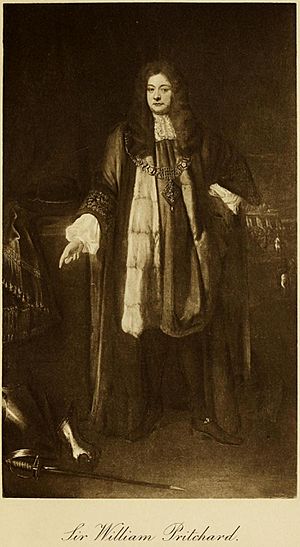William Prichard (politician) facts for kids
Sir William Pritchard (born around 1632, died 1705) was an important English merchant and politician. He became the Lord Mayor of London in 1682. He was known for his business success and his role in the city's government during a time of big changes in England.
Template:TOC limit=3
Contents
Early Life and Business
Sir William Pritchard was born around 1632. He was the second son of Francis Prichard and Mary Eggleston from Southwark. He grew up to become a successful merchant. He was also a member of the Merchant Taylors' Company, a group for people involved in the clothing trade.
Pritchard was an alderman for the Broad Street area of London. This meant he was a senior member of the city's government. His business activities helped him become quite wealthy.
A Leader in London Politics
Sir William Pritchard was very active in London's city government. He held several important positions.
Becoming Sheriff of London
In 1672, Pritchard became the Sheriff of London. This was a powerful role that involved keeping law and order in the city. He was also knighted in the same year, which meant he was given the title "Sir" by the King.
The Lord Mayor Election of 1682
In 1682, Sir William Pritchard ran for Lord Mayor of London. This was a very important election. He was the candidate supported by the King's party, known as the "court party." After a close vote, he was declared the winner.
His election was a big victory for the King's supporters. People celebrated with special songs and poems. Even the famous composer Henry Purcell wrote music for one of these songs.
Challenges as Mayor
As Lord Mayor, Pritchard continued the policies of the previous mayor. He faced some challenges, especially with the election of new sheriffs. He refused to let two elected sheriffs, Thomas Papillon and John Dubois, take their positions.
Later, in 1684, Pritchard was briefly arrested because of these actions. This caused a big stir in London. The city government had to announce that they were not involved in his arrest.
Pritchard then sued Thomas Papillon for false arrest. The case was heard by Judge George Jeffreys. Pritchard won the case and was awarded a large sum of money. Papillon had to leave the country to avoid paying. However, Pritchard later agreed to release Papillon from the judgment.
Losing and Regaining Favor
Sir William Pritchard's relationship with the King changed over time. In 1687, he and other city leaders were removed from their positions. This happened because they disagreed with the King's plans for religious freedom.
He seemed to get back into favor later. But in 1688, he refused to act as an temporary mayor during a difficult time for the King.
Member of Parliament
Besides his roles in London's city government, Sir William Pritchard also served in the English Parliament.
Representing the City of London
He was elected as a Member of Parliament for the City of London in 1685. He was elected again in 1690. This meant he helped make laws for the whole country.
After the Glorious Revolution in 1688, when a new king came to power, Pritchard remained active in politics. He continued to support the Tory party and the Church of England. He tried to get elected to Parliament again in 1698 and 1701 but was not successful. However, he was elected once more in 1702.
Later Life and Legacy
Sir William Pritchard passed away on February 20, 1705, at his home in London. He was buried in a vault at Great Linford in Buckinghamshire.
Contributions and Gifts
Pritchard was known for his generosity. He was the president of St. Bartholomew's Hospital in London. He helped build a special area there for a type of surgery.
In Great Linford, where he owned land, Pritchard founded and supported an almshouse and school buildings. An almshouse is a place that provides housing for poor people. His wife, Sarah Coke, also added to his gifts after his death.
A portrait of Sir William Pritchard can be found at Merchant Taylors' Hall.
Family
Sir William Pritchard was married to Sarah Coke from Kingsthorp, Northamptonshire. They had three sons and one daughter. Sarah was also buried at Great Linford in 1718. According to Pritchard's will, his land in Buckinghamshire went to his nephews, Richard Uthwart and Daniel King.
Images for kids
 | Delilah Pierce |
 | Gordon Parks |
 | Augusta Savage |
 | Charles Ethan Porter |



